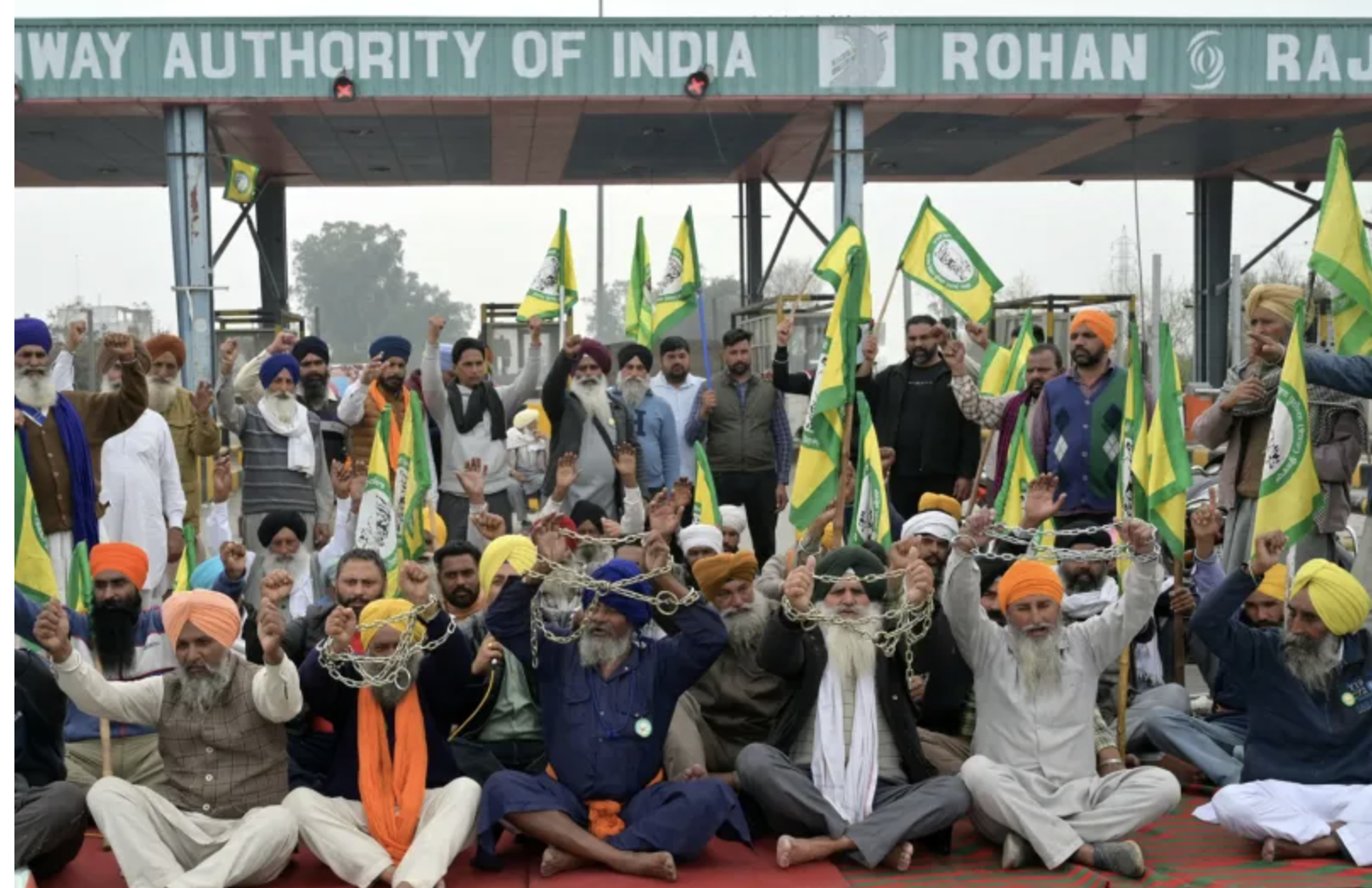Agricultural workers are a key constituency in the country’s upcoming elections.
Thousands of farmers in India paused their march toward Delhi on Wednesday after Prime Minister Narendra Modi’s administration proposed resuming talks. “It is important for us to maintain peace,” Agriculture Minister Arjun Munda wrote on X, formerly Twitter. Modi will seek his third term in general elections later this year and requires support from India’s large and influential farmers’ bloc for success.

Protests on Hold
Around 10,000 farmers, along with 1,200 tractors and wagons, had gathered at villages near the Haryana state border to demand higher prices for their produce. Police fired tear gas and water cannons at the protesters as well as erected barricades, diverted traffic, and shut down two key entry points north of New Delhi to stop their pursuit toward the nation’s capital. At least one demonstrator has been killed in the clashes thus far, according to Punjab’s chief minister, though Haryana police deny the allegation.
The protesters said they will resume their march toward the capital on Friday if their demands for guaranteed crop prices are not met. The farmers’ unions rejected the government’s previous proposal on Monday for a five-year contract that guarantees minimum support prices for farmers who diversify their produce, arguing that additional food grains must be covered under the terms.
Among the farmers’ biggest complaints, they have accused Modi of not keeping promises that his administration made more than three years ago during the country’s last major agricultural protests. In November 2020, thousands of farmers camped outside Delhi’s borders to protest proposed controversial agricultural reforms. They feared that the new laws would reduce their incomes by ending a system that guaranteed minimum prices for certain essential crops. The demonstrators demanded that Modi introduce legislation defining set prices as their legal right so as not to be at the mercy of the markets. However, Modi rushed the reform package through parliament, arguing that the reforms were necessary to modernize India’s agricultural sector.
Modi’s actions were just one of many “bold decisions with little care for democratic decision-making,” FP’s Ravi Agrawal wrote at the time. Dozens of farmers died during the yearlong protests, many from suicide, cold weather, or COVID-19. Eventually, Modi agreed to repeal the reform package in November 2021—just in time for state elections in Uttar Pradesh and Punjab, where Modi’s Bharatiya Janata Party was looking to shore up support. This year, the farmers’ unions are hoping that Modi’s electoral needs will once again push the administration to meet their demands.
Today’s Most Read
- Two Years On, What’s Next in Ukraine? by FP Contributors
- The Age of Intelligence Diplomacy by Brett M. Holmgren
- The West Is Losing Muslim Liberals by Mustafa Akyol
What We’re Following
Israel’s ongoing war. An Israeli airstrike killed at least two people in a residential building in Damascus, Syria, on Wednesday. The Israeli military did not comment on the attack, but a senior Western diplomat told the New York Times that the operation attempted to target Iranians near a site used by Tehran’s military. The Israel Defense Forces have conducted hundreds of past strikes on Iranian-linked targets and Iranian proxy groups in Syria.
Meanwhile, on Tuesday, Israel ordered two neighborhoods in Gaza City to evacuate, and the World Food Program (WFP) halted deliveries to the north after aid convoys were overwhelmed with “crowds of hungry people,” forcing workers to fend off civilians trying to climb the trucks. The agency “faced complete chaos and violence due to the collapse of civil order,” the WFP said. One in 6 Palestinian children under age 2 in the north are acutely malnourished, according to a new UNICEF study.
Third-party consequences. The European Union passed a new sanctions package on Wednesday targeting Chinese and Indian companies that support Russia’s war efforts. Nearly 200 individuals and entities fall under the new restrictions, and Brussels is considering adding another round of sanctions following the recent death of opposition leader Alexei Navalny at a Russian penal colony last week. Although this is the EU’s 13th set of sanctions in response to Russia’s invasion of Ukraine nearly two years ago, it is the first time that the bloc has targeted Chinese and Indian corporations for their third-party involvement.
Russia’s security services also faced increased global scrutiny on Tuesday after authorities arrested a Los Angeles resident with dual Russian-U.S. citizenship for state treason. The 33-year-old woman was accused of sending just over $50 to a U.S.-based nonprofit that sends aid to Ukraine. If convicted, she could face up to 20 years in prison.
Congo Islamist violence. Members of the extremist Allied Democratic Forces (ADF) killed at least 24 people in the Democratic Republic of the Congo this week, local officials and civil society activists announced on Tuesday. The rebel group, which has ties to the Islamic State, is just one of around 120 militant organizations fighting for power in the region. On Tuesday, the U.N. Security Council sanctioned the leaders of six such armed groups, including two people associated with the ADF.
Nearly 7 million civilians have been displaced within Congo in the past 30 years as militant groups vie for land and resources. The March 23 Movement is among the most notorious rebel groups there, with the Rwandan government allegedly supporting the organization to secure greater mineral access for itself. Kigali denies any involvement in the conflict.
Odds and Ends
Locals of Cape Town stepped outside to an “unimaginable” and “overwhelming” stench this week after a ship transporting 19,000 live cattle docked at the South African port on Sunday. The smell of feces and ammonia blanketed the city, sparking outcry over the poor treatment of animals that are transported across the ocean. The ship departed for Iraq on Wednesday, to the great relief of Cape Town’s residents.
Excerpts: Foreign policy Magazine, 21 Feb 2024.
Alexandra Sharp is the World Brief writer at Foreign Policy.




COMMENTS